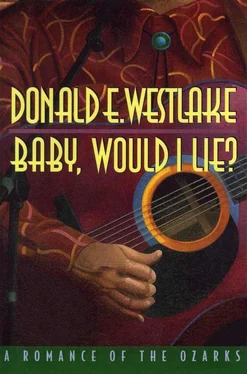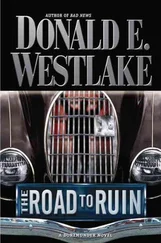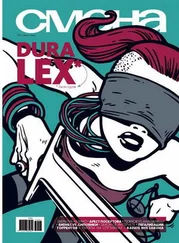“Well, I’ll try it,” Cal agreed, and went away around the conference table to hunker down beside Ray and engage in muttered conversation for a while. Ray raised an eyebrow in her direction at one point (she smiled like a sunny schoolgirl back at him), then muttered with Cal some more, then turned to mutter at Jolie on his other side, and from the great lightning-flash thunderclouds that immediately formed all over Jolie’s head, Sara knew the answer was good news even before Cal came back and said, “It’s okay. Ray’ll fix it.”
“ Thank you, Cal. And thank you, Ray.” She smiled and nodded in his direction, but he wasn’t looking at her.
“Only for a minute, though,” Cal warned.
“That’s all I want; that’s all I ask. Boy, I appreciate this, Cal.”
“Sure,” Cal said, looking dubious but relieved.
The afternoon session in court brought more meat but not less controversy. A skinny rat-faced young woman, Jayne Anne Klarg, identified as an ex-employee of the Ray Jones Country Theater, had allegedly been called by the prosecution to testify that she had seen Ray Jones in what appeared to be intimate conversation with Belle Hardwick on more than one occasion (not including the night of the murder, unfortunately, which was not emphasized), but it soon became clear that she was actually on the witness stand to suggest she’d left Ray Jones’s employment because he’d made unwelcome sexual advances and had frightened her when she had rejected him.
Warren was getting a lot of exercise today, popping to his feet at every other word, objecting all over the place, while Jayne Anne glared. Fred Heffner, the state prosecutor from Springfield handling the testimony, did his best to insert the information into the ears and brains of the jurors despite Judge Quigley’s reluctant agreement that he really shouldn’t do that.
Sara had expected Warren to chew Jayne Anne to bits when it came time for cross-examination, but he had a different tack in mind. Mildly, he said, “You quit your job at the Ray Jones Country Theater?”
“Because he was all the time—”
“I asked you,” Warren overrode her, “if you quit your job.”
“Of course, I did! Nobody likes to be treated—”
“You weren’t fired, is that right?”
She blinked. She looked wary. “I was quittin,” she insisted, which was an odd locution, all in all.
Warren returned to the defense desk, picked up a piece of paper — a business letter, it looked like — and returned to the witness. Holding it up in front of her, he said, “Is this a copy of a letter that was sent to you by the box-office manager at the Ray Jones Country Theater?”
She squinted. She didn’t like that. “I guess so.”
Fred Heffner was on his feet. “May I see that letter?”
“After Judge Quigley, I think,” Warren told him. He handed the letter to the judge, who read it, frowned with disapproval at the witness, and handed the letter to Fred Heffner, who read it, looked extremely expressionless, handed the letter back to Warren, and returned silently to his seat.
Warren: “You were dismissed, were you not?”
Jayne Anne: “I was quittin.”
Warren: “You were not dismissed for any reason having to do with Ray Jones or unwanted overtures, were you?”
Jayne Anne: “What?”
Warren: “You were dismissed for—”
Heffner (rising): “Your Honor, the reason for Miss Klarg’s dismissal is immaterial to the matter at hand. We do not dispute the defense contention that Miss Klarg did not resign, as she earlier suggested to us, but was dismissed.”
Warren: “Thank you, counselor.”
Quigley: “The reason for the dismissal need not concern us.
Warren: “Agreed, Your Honor.” To the witness (smiling): “But you did pay it back, didn’t you?”
Heffner (rising, wounded): “Your Honor!”
Warren: “Withdraw the question. I’ve finished with this witness. Your Honor.”
The next witness was the gate guard at Porte Regal, who for Fred Heffner was absolutely positive it had been Ray Jones’s red Acura SNX he’d waved through into the compound late that night, and who for Warren Thurbridge was equally absolutely positive he couldn’t be sure who’d been at the wheel, or indeed how many people had been in the car.
And there, astonishing everybody, the prosecution rested. It was barely three in the afternoon. Warren agreed with the suggestion from the bench that the defense didn’t feel like starting its presentation today and Judge Quigley gaveled the court closed until 9:30 the following morning.
A quick phone call was made to the motel in Branson where the shadow jury was being sequestered and then the defense team plus Sara crossed the street to Warren’s offices to await the jurors’ arrival.
The feeling in Warren’s offices was cheerful, even smug. What had the prosecution presented, after all? Their circumstantial evidence, boring, easily forgotten, all last Friday. This morning, the jury had essentially seen nothing but the judge agreeing with the defense and chastising the prosecution, and this afternoon the prosecution’s principal witness had exploded in their faces. The state had shot its bolt, it hadn’t laid a glove on Ray Jones, and now all the defense had to do was establish the principle of reasonable doubt and they’d be home free.
The self-congratulatory sense of well-being was infectious. Sara felt the lift of it herself, though it wasn’t her fight and, realistically speaking, the outcome didn’t matter to her one way or the other. She was an experienced reporter and an experienced magazine writer. Whatever the conclusion of the trial, Sara would find within it a larger meaning, a mirror in which America could gaze upon itself with perhaps a new understanding, blah blah blah. Nothing to it.
About twenty minutes later, the shadow jury’s bus — not a Ride the Ducks, but a charter from Interstate, for whom Ray used to do promos and, who knows, might again — arrived out front. Through the curtained former showroom window, Sara watched the people, who looked remarkably like the actual jurors she’d been observing in the courtroom across the street, climb down from the bus, squint in the sunlight — the bus windows were tinted — and cross the sidewalk toward the building.
“Oh my God!”
Sara jumped away from the window as though it had grown teeth and bitten her. The jurors were beginning to enter, to file past her toward the conference room. There was a secretary’s desk behind her; she dashed to it, sat down, swiveled the chair halfway around so her back was to the jurors, and became very interested in the contents of a bottom file drawer.
Immediately, Jolie was at her side, reaching down as though to slam that drawer, barking, “Get out of there! What do you think you’re doing?”
“Shut up!” Sara hissed, with such commanding urgency that Jolie stepped back, startled, and stared at her as though Sara were foaming at the mouth.
Sara risked a look over her shoulder. The last of the jurors was passing, was gone. Straightening, she said, “Jolie, get Warren out here. Now. Before anything else happens.”
“Have you lost your—”
“Don’t be a fool , Jolie. You can tell when I mean it.”
Jolie could. She gave Sara one last glare — this better be good, kid — then turned and bustled off to take Warren away from his jurors.
Which gave Sara a minute to look around and think, so that when Warren came back with Jolie, distracted and irritated, saying, “What’s this?” Sara merely rose, put her finger to her lips, and motioned for them to follow her outside. They didn’t want to — they wanted to believe she’d gone crazy — but they followed.
Hot humid sunlight beat down on the sidewalk. Sara turned, and as Warren and Jolie both started to demand something or other, she said, “One of your jurors is a ringer.”
Читать дальше







